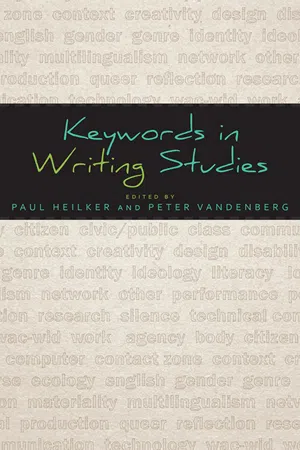
- English
- ePUB (mobile friendly)
- Available on iOS & Android
Keywords in Writing Studies
About this book
Keywords in Writing Studies is an exploration of the principal ideas and ideals of an emerging academic field as they are constituted by its specialized vocabulary. A sequel to the 1996 work Keywords in Composition Studies, this new volume traces the evolution of the field's lexicon, taking into account the wide variety of theoretical, educational, professional, and institutional developments that have redefined it over the past two decades.
Contributors address the development, transformation, and interconnections among thirty-six of the most critical terms that make up writing studies. Looking beyond basic definitions or explanations, they explore the multiple layers of meaning within the terms that writing scholars currently use, exchange, and question. Each term featured is a part of the general disciplinary parlance, and each is a highly contested focal point of significant debates about matters of power, identity, and values. Each essay begins with the assumption that its central term is important precisely because its meaning is open and multiplex.
Keywords in Writing Studies reveals how the key concepts in the field are used and even challenged, rather than advocating particular usages and the particular vision of the field that they imply. The volume will be of great interest to both graduate students and established scholars.
Tools to learn more effectively

Saving Books

Keyword Search

Annotating Text

Listen to it instead
Information
Work
Table of contents
- Cover
- Title Page
- Contents
- Introduction
- Agency
- Body
- Citizen
- Civic/Public
- Class
- Community
- Computer
- Contact Zone
- Context
- Creativity
- Design
- Disability
- Discourse
- Ecology
- English
- Gender
- Genre
- Identity
- Ideology
- Literacy
- Location
- Materiality
- Multilingual/ism
- Network
- Other
- Performance
- Personal
- Production
- Queer
- Reflection
- Research
- Silence
- Technical Communication
- Technology
- Work
- Writing across the Curriculum/ Writing in the Disciplines
- About the Contributors
Frequently asked questions
- Essential is ideal for learners and professionals who enjoy exploring a wide range of subjects. Access the Essential Library with 800,000+ trusted titles and best-sellers across business, personal growth, and the humanities. Includes unlimited reading time and Standard Read Aloud voice.
- Complete: Perfect for advanced learners and researchers needing full, unrestricted access. Unlock 1.4M+ books across hundreds of subjects, including academic and specialized titles. The Complete Plan also includes advanced features like Premium Read Aloud and Research Assistant.
Please note we cannot support devices running on iOS 13 and Android 7 or earlier. Learn more about using the app